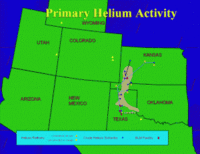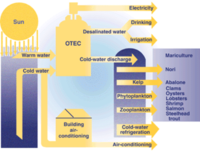-
Software to help plan the smart grid
Researchers have developed a new software tool called the Energy Zones (EZ) Mapping Tool that will help the thirty-nine states which make up the Eastern Interconnection States’ Planning Council, or EISPC identify geographic areas suitable for the development of clean energy resources, which are renewables, natural gas, coal carbon sequestration, and nuclear. Certain forms of energy storage are also included.
-
-
Horse meat in the human diet
Horse long has been on menus in continental Europe, sold from shops that often advertise with a carved horse head on the store front.A chemist explains the testing for horse DNA in food products, and discusses the concerns about selling and eating horse meat in the United States.
-
-
U.S. tech companies actively lobbying for immigration reform
Last year, only 14 percent of immigrants (around 144,000 people) were granted a green card owing to their skills and contribution to the U.S. economy. The rest of the green cards were given mostly based on family ties of the applicants to U.S. citizens. Under the Senate immigration proposal, 50 percent of future green cars would be based on skills and employment opportunities. Leading U.S. tech companies are actively campaigning in support of the proposal.
-
-
DHS chemical plant security program hobbled by problems, poor oversight
A DHS program responsible for the security of chemical facilities, such as the West Fertilizer Company plant in Texas, has been ineffective owing to a number of issues, leading federal investigators to wonder “whether it can achieve its mission, given the challenges the program continues to face.”
-
-
U.S. policy may lead to growing global shortage of helium

Helium is an essential resource in technologies such as medical imaging, rocket engines, and surveillance devices. In response to the element’s scarcity, the United States has been stockpiling helium since the 1960s in a National Helium Reserve called the Bush Dome, a deep underground reservoir outside of Amarillo, Texas. In 1996 the Helium Privatization Act mandated that the Department of the Interior sell off all the stockpiled helium by 2015. Scientists say that this action discourages the active exploration of helium since companies can buy it from the United States at a cheap price and sell it at a premium. The result will be a growing shortage of helium.
-
-
Kenya police: (fake) bomb detectors work, making Kenyans safer

A British businessman was convicted of selling Iraq and Afghanistan fake bomb detectors – the two countries used millions of dollars in U.S. aid money to purchase the sham devices (the devices were, in fact, $20 golf ball finders which the businessman sold for $40,000 each). The police in Kenya purchased twenty-six of the sham detectors, but Nairobi police chief says the devices work, and that Kenya is safer for them.
-
-
Critics say E-Verify system still has too many problems

Lawmakers and attorneys in Minnesota believe that the E-Verify system, a government database for employers to verify that their new hires are eligible to work in the United States, may not be ready just yet.. Lawmakers have raised concerns about a clause in the Senate immigration legislation which would make the E-Verify system mandatory for all businesses within five years.
-
-
U.K. businessman convicted of selling fake explosives detectors

James McCormick, a British businessman, was convicted of having made millions in profits from selling fake bomb detectors to Iraq, Georgia, and several other countries. McCormick bought $20 golf ball finders in the United States, then sold the devices, which had no working electronics, for $40,000 each. The Iraqi government used more than $40 million in U.S. aid money to buy 6,000 of the devices, despite being warned by the U.S. military that the devices were a sham. The Iraqi military used the fake detectors at check-points, leading to scores of soldiers and civilians being killed by suicide trucks which went through the check points undetected. The police in Kenya says it will continue to use the devices.
-
-
California considering lead ammo ban

Health and environmental advocates are trying to make California the first state to enforce a statewide ban on the use of lead bullets for hunting. The U.S. Geological Survey (USGS) estimates that there are 400,000 pieces of lead shot per acre in wild game territory which can be eaten or washed into rivers and waterways. The USGS also says that 60,000 metric tons of lead fired off last year is the second largest use of lead in the United States behind batteries. The CDC reports that lead is so abundant in meat harvested through hunting, that pregnant woman and children should never eat it. The NRA opposes the ban, saying it could possibly the end of hunting in California.
-
-
Volatility of food prices is still a mystery
Riots, political instability, and a spike in malnourishment cases blighted the years 2007 and 2008, particularly in developing countries. The cause was a sudden surge in global food prices, with rice eventually rising several hundred per cent as importing countries simply could not get enough of this basic foodstuff.Food market volatility has yet to be understood, and there is no definite proof that it is due to speculators.
-
-
White House to take a second look at FAA furloughs

The White House hinted Wednesday that it could accept legislation which would end Federal Aviation Administration (FAA) furloughs. Passengers have been in arms over lengthening flight delays and a growing number of flight cancellations, while GOP lawmakers accused the FAA of implementing the sequester-mandated budget cut in such a way so as to cause maximum inconvenience to passengers.
-
-
EPA slams State Department’s Keystone XL pipeline review
The Environmental Protection Agency (EPA) on Monday criticized the State Department’s environmental impact review of the Keystone XL pipeline, saying there was not enough evidence to back up key conclusions in the review on emissions, safety, and alternative routes. The EPA’s comments could have a negative effect on the approval of the project, but if the project is approved, the comments could serve as supporting evidence in any ligation against the pipeline.
-
-
McCaul to draft cybersecurity bill
House Homeland Security chairman Michael McCaul (R-Texas) said he was drafting his own cybersecurity bill, which will define the role of DHS in sharing information with private companies about cyber threats. McCaul hopes to agree on a compromise with the White House, which threatened to veto the bill.
-
-
Ocean thermal energy conversion power plant to be built off southern China’s coast

Lockheed Martin has announced that it is working with Chinese company Reignwood Group to develop an Ocean Thermal Energy Conversion (OTEC) pilot power plant off the coast of southern China. The prototype plant will be the first project in the multi-billion dollar clean energy agreement between the two companies. OTEC takes the natural temperature difference found in the ocean in tropical regions and uses it to create power. This technology is well-suited to island and coastal communities.
-
-
U.S. hospitals shipping sick immigrants back to their home countries

Hundreds of immigrants who are in the United States illegally end up in the hospital only to find out they will be sent home through a removal system run by hospitals trying to avoid the high cost of treating illegal immigrants.
-
More headlines
The long view
Factories First: Winning the Drone War Before It Starts
Wars are won by factories before they are won on the battlefield,Martin C. Feldmann writes, noting that the United States lacks the manufacturing depth for the coming drone age. Rectifying this situation “will take far more than procurement tweaks,” Feldmann writes. “It demands a national-level, wartime-scale industrial mobilization.”
Trump Is Fast-Tracking New Coal Mines — Even When They Don’t Make Economic Sense
In Appalachian Tennessee, mines shut down and couldn’t pay their debts. Now a new one is opening under the guise of an “energy emergency.”
Smaller Nuclear Reactors Spark Renewed Interest in a Once-Shunned Energy Source
In the past two years, half the states have taken action to promote nuclear power, from creating nuclear task forces to integrating nuclear into long-term energy plans.
